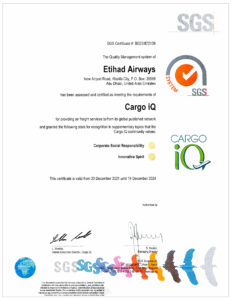
Cargo iQ recertification reflects Etihad Cargo’s commitment to continuously improving the air cargo customer experience
Etihad Cargo, the cargo and logistics arm of the Etihad Aviation Group, has successfully renewed its Cargo iQ certification in accordance with Cargo iQ Standards for quality management.
Following a rigorous audit on the UAE national carrier’s compliance with the Cargo iQ airline member requirements conducted by independent auditor SGS, Etihad Cargo achieved Cargo iQ recertification for its global network.
Etihad Cargo was awarded two supplementary stars to recognise the carrier’s performance in the “Corporate Social Responsibility” and “Innovative Spirit” categories.

“Etihad Cargo plays a vital and crucial role in today’s global supply chain,” said Thomas Schürmann, Head of Cargo Operations and Delivery at Etihad Cargo. “Therefore, it is imperative that all Etihad Cargo’s efforts toward meeting, providing and exceeding customer needs and requirements must be fully compliant and aligned with global industry standards that promote harmony, transparency, and industry-wide best practices. Etihad Cargo is proud to have been re-certified by Cargo iQ and that Etihad Cargo’s products, services, operations, as well as the delivery of its promise and commitment to customers and the market, are in line with the Cargo iQ airline member requirements.”
Cargo iQ is an IATA interest group with the mission of creating and implementing quality standards for the worldwide air cargo industry. The Cargo iQ certification and its stringent airline member requirements are at the core of Etihad Cargo’s Service Delivery and Performance Management. The certification also serves as a benchmark for the cargo carrier in keeping its processes aligned with industry best practices for the benefit of its customers from all over the world.
As a collaborative, multi-stakeholder community that works towards continuously improving the air cargo customer experience, Cargo iQ provides the industry Quality Management System for service delivery; real-time end-to-end transparency in planning, execution and evaluation of shipments; and standards and practices that facilitate the ever-evolving business models and needs.






